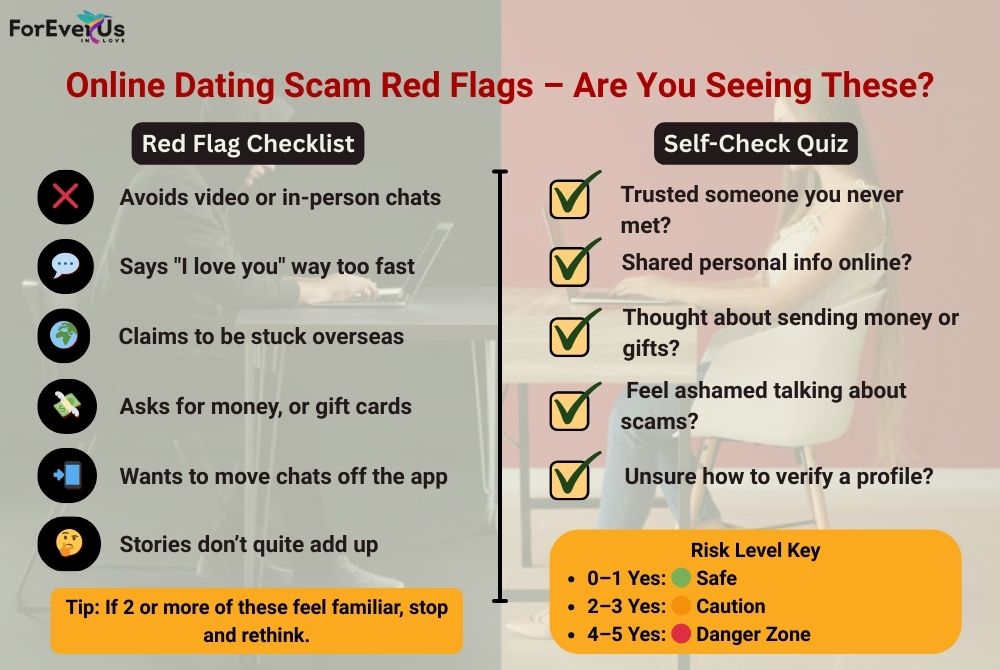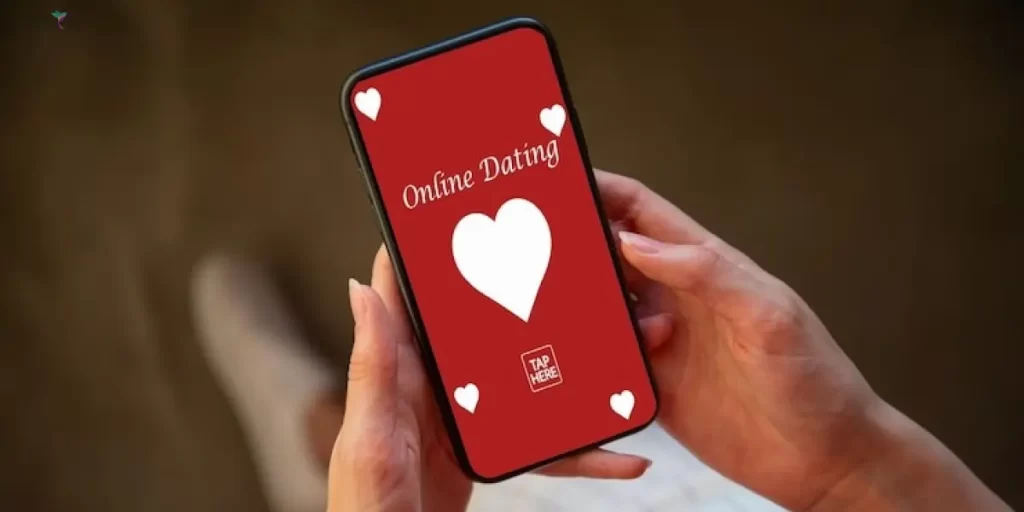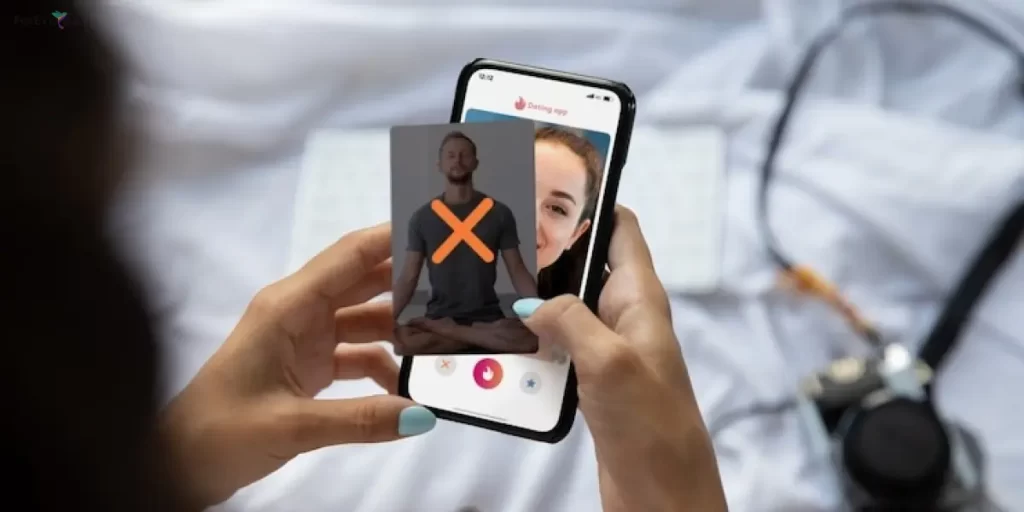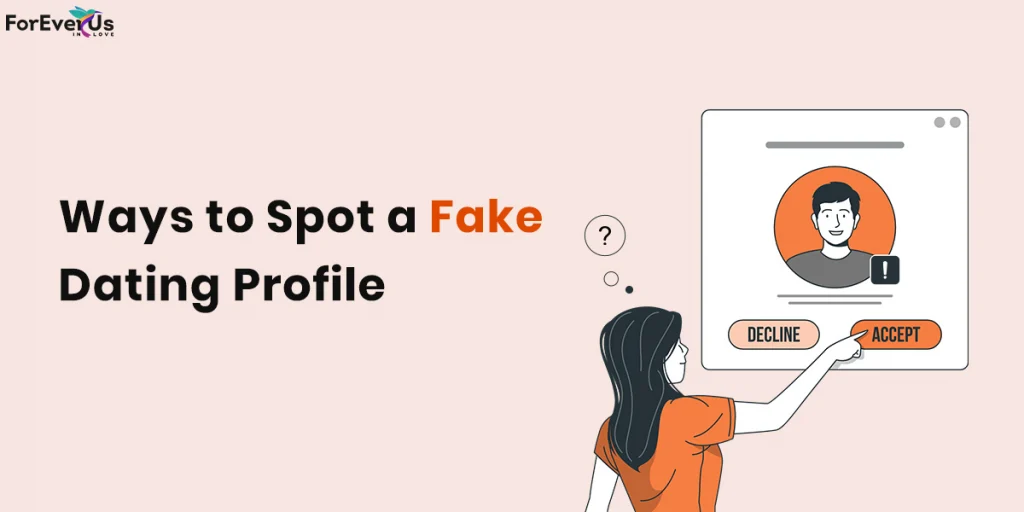Did you know online dating scams cost Americans over $1 billion in losses last year alone? Even tech-savvy singles fall for them — fast.
Online dating can spark amazing connections — but it also opens the door to dangerous scams. From fake profiles and emotional manipulation to devastating financial loss, online dating scams are getting smarter, more sophisticated, and heartbreakingly common.
Whether you’re new to dating apps or have years of experience, knowing how to protect yourself has never been more important. You’re not stupid for trusting someone — you’re human. And that’s what scammers count on.
Ever received a message that seemed too perfect? Or met someone online who made you feel instantly special — but something just felt… off? That uneasy gut feeling might be your first line of defense.
If you’ve ever asked yourself, “How can I tell if someone is scamming me on a dating app?” or “What are the biggest red flags in online dating scams?” — you’re in the right place.
This complete guide will walk you through:
- How scams work and who gets targeted
- Psychological manipulation techniques
- Real-world scam examples and shocking stats
- Prevention and recovery strategies
- Expert insights and interactive tools
Let’s dive in — and stay safe together.
What Are Online Dating Scams?
Online dating scams, also known as romance scams, occur when a person pretends to be romantically interested in someone to build trust and manipulate them for financial or personal gain.
Why does it matter? Because these scams don’t just cost money — they devastate emotional well-being and mental health.
Latest Online Dating Scam Statistics (2025)
- Average victim loss: $9,450
- Most targeted platforms: Facebook Dating, WhatsApp, POF
- Top scam types: Fake military, cryptocurrency investments, medical emergencies
Scamwatch, Kaspersky, and the Texas Attorney General all agree: these scams are rising fast. Online dating scams 2022 were bad — 2025 is worse.
Why Do Scammers Target Online Dating Platforms?
Scammers don’t just want your money — they exploit your emotions. But why do people scam in online dating?
- Emotional manipulation: Scammers prey on loneliness and trust.
- Financial gain: Most scams revolve around asking for money.
- Low risk for scammers: Hidden behind screens, many operate across borders, making them hard to catch.
Why is falling for scams such a big deal? Because victims often lose not just money but confidence, trust, and emotional well-being.
Why Do People Fall for Romance Scams?
Even smart, educated individuals can fall victim to online dating scams — because these scams are emotional, not logical. Scammers build relationships over time, creating a deep sense of trust.
- They appeal to empathy and vulnerability.
- They create believable stories involving hardship, travel, or urgent need.
- They make victims feel seen, heard, and cared for — even if it’s fake.
When emotions cloud judgment, red flags can be easily overlooked.
How Do Online Dating Scams Work?
Understanding how online dating scams work is key to avoiding them. Here’s a simplified breakdown:
- Creating a fake identity: Using stolen pictures (commonly of military or foreign workers).
- Building trust: Daily chats, love-bombing, emotional confessions.
- The ask: Money for an emergency, travel costs, medical bills, or even iTunes gift cards.
- Disappearing act: Once you send money or challenge them, they vanish.
Pro tip: Scammers often use tactics like catfishing, fake military deployment, or oil rig jobs to make their stories seem legit.
Common Online Dating Scam Warning Signs
Scammers follow patterns. Look out for these red flags in online dating:
- They profess love quickly.
- They avoid video chats or in-person meetings.
- They ask for money, gift cards, or personal info.
- They have inconsistent stories or poor grammar.
- They direct you off the dating app quickly (often to WhatsApp or Telegram).
Looking for online dating scam signs?
Ask yourself:
- Are they avoiding real-time calls?
- Is their profile too perfect?
- Are they always facing some emergency?
Psychological Manipulation Techniques Used by Scammers
What makes these scams so powerful isn’t just the lies — it’s the psychology. Here’s how scammers get into victims’ heads:
- Love Bombing: Showering you with affection fast to gain trust.
- Gaslighting: Making you question your doubts or reality.
- Guilt-Tripping: “If you loved me, you’d help me…”
- Scarcity & Urgency: Creating artificial time pressure — “This deal closes today!”
Understanding these techniques is the first step toward resisting them.
Who Gets Targeted in Online Dating Scams?
Understanding Demographics Scammers tailor their tricks depending on who they’re targeting:
Each group gets specific approaches, making awareness crucial. Ever wondered how common are online dating scams? According to the FBI, romance scams cost Americans over $1 billion annually — and that’s just what’s reported.
Real-Life Stories: Case Studies That Will Shock You
- Military Impersonation Scam: A 62-year-old woman lost $150K to a scammer claiming to be a deployed U.S. soldier.
- Crypto Romance Scam: A tech-savvy man was lured into investing in fake crypto platforms through his online “girlfriend.”
- Mark’s Story: A 42-year-old from Texas lost $5,000 after trusting a woman he met on a dating app who posed as a crypto trader.
These aren’t just stories — they’re lessons in what to watch out for.
Tech & Digital Red Flags to Watch For
Online dating scammers don’t just lie — they leave digital clues. Here’s how to spot online dating scams using tech:
- Reverse image search: Check profile pics for duplicates online.
- Email header analysis: Look for odd domains or redirections.
- Spoofed sites: Scammers may send you to fake dating site clones.
- Suspicious email addresses: Use tools like EmailRep or MXToolbox to verify.
Be cautious of online dating security ID scams and verification scams — those sites claiming to “verify” identity for a fee are often traps.
What to Do If You’ve Been Scammed
First, take a deep breath — falling for a romance scam does not mean you’re foolish or weak. These scammers are calculated, manipulative, and emotionally skilled. You’re not alone, and there is a clear path to recovery.
Step-by-Step: How to Respond After Being Scammed
A unique type of polyamorous relationship. One person is monogamous and stays loyal to one partner, while the other follows a polyamorous relationship that involves other partners. It does not come forward as cheating as the mutual consent of both partners is involved.
1. Cut off all contact — immediately.
Block the scammer on all platforms: dating apps, email, phone, social media, etc. Don’t respond, even if they try to guilt-trip you.
2. Save all evidence.
Keep screenshots of chats, emails, photos, and any suspicious transactions. These are crucial for reporting and investigations.
3. Report the scam.
- To the dating app or website
- Your bank or payment platform (if money was involved)
- Scam-reporting bodies like the FTC, FBI IC3, or your country’s cybercrime unit
4. Monitor your financial and personal security.
- Contact your bank to flag fraudulent activity
- Freeze or monitor your credit with major bureaus
- Consider changing passwords if any were shared
5. Get emotional support.
You’re not just dealing with financial loss — you’re grieving trust, hope, and connection.
- Talk to a therapist or counselor
- Join a support group for scam victims
- Confide in someone you trust — don’t carry it alone
Healing Tip:
Looking for romance scam recovery advice? The process may feel overwhelming, but healing is both emotional and practical. Step by step, you will rebuild trust in yourself and others.
You’re not alone — and this isn’t the end of your story. ❤️
Where to Report Online Dating Scams
Wondering how to report online dating scams? Here’s where:
- Dating platform’s abuse or fraud team
- FBI Internet Crime Complaint Center (IC3)
- Scamwatch.gov.au
- Your local police
- Consumer protection agencies
The sooner you act, the better the chances of stopping the scam.
Are You at Risk? Red Flags, Reality Check
Think you’d never fall for a scam? These quick checks will help you stay sharp and safe while dating online.

Romance Scam Red Flag Checklist
Use this simple checklist to spot a scam early:
- They avoid video chats or in-person meetings.
- They profess love very quickly.
- They claim to be overseas or in some kind of urgent situation.
- They ask for money, gift cards, or cryptocurrency.
- They push you to move the conversation off the dating app (to WhatsApp, Telegram, etc.).
- Their stories don’t add up — or they’re overly dramatic.
If you answered “yes” to 2 or more, it’s time to pause and reconsider.
Self-Quiz: Are You at Risk?
Answer Yes or No to the following:
- I’ve trusted someone online without meeting them in person.
- I’ve shared personal information with someone from a dating app.
- I’ve thought about sending money or gifts to an online match.
- I would feel embarrassed to talk about a possible scam.
- I don’t know how to check if someone’s real or fake online.
Your Results:
- 0–1 Yes: You’re cautious — keep it up.
- 2–3 Yes: You may be at risk — stay alert and educate yourself.
- 4–5 Yes: You’re highly vulnerable. Revisit the checklist and take extra care.
Conclusion
Online dating should be a journey of connection — not deception. By knowing how to detect online dating scams, recognizing red flags, and taking action, you empower yourself to date safely and confidently.
Love isn’t rushed. Real people don’t ask for money. If your gut says something’s off, listen.
You’ve just armed yourself with knowledge that scammers hope you never learn. Keep your heart open — but protect it with awareness, tools, and trust in your instincts. Want to meet real, verified singles? Try ForEver Us In Love – where trust is non-negotiable.
Don’t be ashamed. Be informed. Be prepared. Stay in control.
Expert Insights: What Cybersecurity Pros and Psychologists Say
- “Scammers don’t just steal money — they hijack trust. That’s what makes them dangerous.” — Dr. Elise Martin, Clinical Psychologist
- “Online dating fraud is evolving. Victims need to be educated, not ashamed.” — James Li, Cybercrime Analyst
- “Most online scams rely on emotional urgency. Always pause before taking action.” — Kaspersky Cybersecurity Team
FAQs
How can I verify if someone is real on a dating site?
You can ask for a real-time video call, reverse-search their photos, and check for inconsistencies in their stories. Never rely solely on profile info.
What should I do if I already sent money to a dating scammer?
Immediately contact your bank, file a report with the FBI IC3 or relevant scam-reporting agencies, and block the scammer. Document everything.
Can I get my money back after a romance scam?
While recovery isn’t guaranteed, acting fast improves your chances. Some banks may reverse transactions or trace fraud. Reporting quickly is key.
Are dating scams more common on certain platforms?
Yes, scams are often reported more frequently on platforms like Facebook Dating, POF, and WhatsApp due to their large user base and less strict verification.












